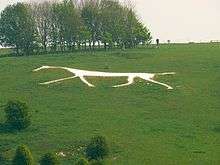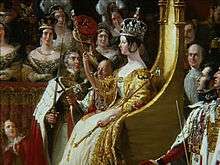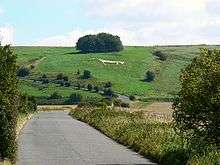Hackpen White Horse

Hackpen White Horse is a chalk hill figure of a white horse on Hackpen Hill, located below The Ridgeway on the edge of the Marlborough Downs, two miles south east of Broad Hinton, Wiltshire, England. It is one of nine white horse hill figures located in Wiltshire. It is also known as the Broad Hinton White Horse due to its near location to Broad Hinton. Supposedly cut by local parish clerk Henry Eatwell in 1838 to commemorate the coronation of Queen Victoria, the horse is 90' square feet and is said to be best viewed from B4041 road. The horse is regularly scoured and maintained.
Origins and early history

The origin of the horse is uncertain,[1] and is sometimes said to be the only 19th century white horse to have little of its history known.[2] It is generally regarded that the horse was cut in 1838 by Henry Eatwell, a parish clerk of Broad Hinton, assisted by a local pub landlord.[2] It is said to commemorate the coronation of Queen Victoria.[1][2]
Description and location
The horse is cut of chalk, is 90' square feet, making it the only square-dimension horse in England, and faces WNW.[2] Although the hill it resides on, Hackpen Hill, is high (600'), it is a gentle slope,[2] especially when compared to the hills of most other Wiltshire horses.[1] Because the hill is slope, the horse is partly banked up and slightly raised from the surrounding grass to make it more easily visible.[1] The head was initially elevated to help with the foreshortening.[2] The best view of the horse is said to be from the nearby B4041 road,[2] whilst the A361 road near Broad Hinton also provides a clear view.[2] Alterna
At the top of the hill is a car park where the Ridgeway crosses the B4041 road, and a footpath stretches from there down to the horse, making the horse accessible to the public.[2] Ironically, many real horses often roam the field.[3] It has been suggested that the stones for Stonehenge and Avebury may have come from a field of sarsen stones just to the south east of its location.[3] The expression "as different as chalk and cheese" is sometimes believed to refer to the land divided by Hackpen Hill. The hill forms the boundary between the high chalk downs to the south of it and the clay cattle country to the north, where cheese is a product of the milk from the cattle, so the two areas "are as different as chalk and cheese."[4] Hackpen White Horse was not the only hillside shape cut to commemorate Queen Victoria; in 1887, for her Golden Jubilee, a hillside row of trees were planted in the shape of a "V" in Westmeston, Sussex.[5]
Scouring and recent history

The horse is regularly scoured (cleaned and maintained). In either May or June 2000, John Wain cleaned it single-handedly, taking him some five hours. He later flew David Brewer over the area to photograph the village of Broad Hinton and the white horse for brewers's book Images of a Wiltshire Downland Village: Broad Hinton and Uffcott.[1] Wain cleaned it annually until Bevan Pope cleaned the horse single-handedly on 23 September 2004.[1] Wain cleaned the horse again with the help of a group of friends on 1 February 2011 and 4 February 2012.[1] On both occasions, they illuminated the newly cleaned horse when the work was completed.[1] Although to illuminate a white horse has been sporadic tradition for other horses in Wiltshire, those occasions marked the first times it had been done for Hackpen White Horse.[6]
In March 2009, the horse (not including any surrounding grass) was covered with a red sheet for the Comic Relief charity's Red Nose Day campaign so that the horse appeared to be a "red horse".[7] The White Horse pub, located half a mile away in Winterbourne Bassett, features an illustration resembling the horse as its logo.[8] The pub itself was named after the eight horses in Wiltshire.[8] Berry Stained Glass have made a stained glass window of the horse.[9] Benoit Philppe's The Hackpen White Horse oil on canvas painting depicts the horse.[10] In 2015, Devizes-based jeweller Daniel Pike created a silver necklace of the horse.[11] In 2005, the horse appeared in episode 1 of series 6 of Top Gear, and in 2012, for a Pukka Pies sponsorship advert for ITV travel series Ade in Britain, Pukka Pies modified a photograph of the location to include a hill figure of one of their pies instead of the horse.[12]
See also
- Wiltshire white horses
- Westbury White Horse
- Pewsey White Horse
- Devizes White Horse
- Broad Town White Horse
- Cherhill White Horse
- Marlborough White Horse
- Alton Barnes White Horse
- Other white horses
References
- 1 2 3 4 5 6 7 8 Wiltshire White Horses: The Hackpen or Broad Hinton or Winterbourne Bassett white horse
- 1 2 3 4 5 6 7 8 9 Hackpen White Horse
- 1 2 Walking the Wessex White Horses - Hackpen
- ↑ Wiltshire White Horses: Folklore and legends
- ↑ Artists and the South Downs - South Downs National Park Authority
- ↑ Wiltshire White Horses: Lighting up the horses
- ↑ BBC - Wiltshire - Comic Relief - Hackpen White Horse goes red!
- 1 2 The White Horse Winterbourne Bassett nr Swindon pub-food/Sunday-Lunch/Hackpen/Dog-Friendly
- ↑ Berry Stained Glass : Hackpen White Horse
- ↑ My French Easel: The Hackpen White Horse
- ↑ White horse inspiration for jeweller and artist (From The Wiltshire Gazette and Herald)
- ↑ Hillfigures.co.uk - A site dedicated to information about hill figures